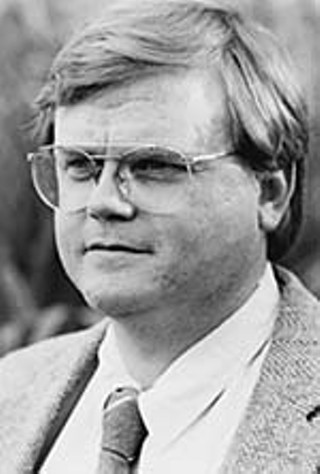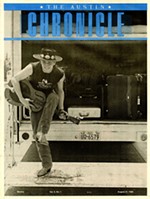Naked City
The propaganda industry
By Lee Nichols, Fri., Oct. 17, 2003

To understand just what Sheldon Rampton and John Stauber do, think of Toto in The Wizard of Oz, tugging at that curtain, yapping away in hopes that someone will look behind it. Rampton and Stauber edit PR Watch (www.prwatch.org), the quarterly newsletter devoted since 1993 to exposing the public relations industry's influences on public policy. Any time you see anyone appearing or quoted in the media, be it a rock star hawking an album or a think-tank talking head, it's no accident.
Following their books Toxic Sludge Is Good for You!, Trust Us -- We're Experts!, and Mad Cow U.S.A., Stauber and Rampton have now penned Weapons of Mass Deception: The Uses of Propaganda in Bush's War on Iraq (Tarcher/Penguin, 248 pp., $11.95). Rampton will discuss that topic Wednesday, Oct. 22, 7:30pm, at the First Unitarian Universalist Church, 4700 Grover. On Thursday, Oct. 23, he will talk about "The Battle for Your Brain: How Commercial and Government Propaganda Have Created a Permanent Information War," at 7pm in Room 105 of Gearing Hall, University of Texas campus (24th Street between Whitis and University avenues).
The Austin Chronicle: I think lots of people might be familiar with media criticism, but explain why you and John engage in PR criticism, and why the public should care about it.
Sheldon Rampton: The public relations industry is a specific branch of a broader propaganda industry that exists. Public relations is distinct from other types of propaganda -- and I'm calling it that because that's what it is, like advertising. It's rather unique because a lot of public relations occurs behind the scenes. If you see an advertisement in the newspaper that tells you to buy toothpaste, you know that that advertisement has been paid for by a company that is trying to get you to do something. But public relations typically involves someone arranging a behind-the-scenes briefing ,or it involves the person who's working behind the scenes to line up guests for a public affairs TV show, and the public doesn't see that machinery. What the public sees is some expert sitting on a talk show providing his expertise on some issue.
And so the reason John and I focus on public relations is because we want that machinery to be visible as well. A lot of the experts you see on television are representing some organization that's trying to sell the public on something just as much as that company's trying to sell toothpaste. But if you don't know who's behind a particular person's message, then you're at a disadvantage when you're trying to decide whether that message is plausible or in your own interests to believe it.
AC: What is the core theme of this book, and what do you want readers to learn from it?
SR: Obviously we want to explain how some of the misrepresentations were made that got us into this mess in Iraq, because I think that helps somewhat in figuring out how we're going to get out of the mess.
I think generally, when John and I write things, we're also trying to explain how things work so that maybe people will be a little more savvy the next time something like that comes around. And one of the things that I found most interesting personally about looking at the way the war was sold is that, for example, we have a chapter titled "True Lies," and we call it that because a lot of the claims that the Bush Administration made don't quite reach the status of being outright lies. There were some things that they said that I think probably could qualify as outright lies, but for the most part, what they did was spin, which is the art of creating appearances without necessarily telling an overt lie.
For example, the whole idea -- that was very successfully planted in the public's mind -- that Saddam Hussein was behind September 11 was never conveyed by a White House official saying "We have evidence showing that that was the case." It was conveyed by constantly mentioning Al Qaeda and Iraq in the same breath, and by insinuating, and by highlighting and magnifying those very few pieces of shaky evidence -- which the administration knew was shaky, but which they presented anyway with great fanfare, without discussing the reasons why that evidence was shaky. And I think that's very interesting, because it tells you something about how spin works in general, and also something about the limits of spin.
One of the things that some of my more paranoid friends were predicting, immediately after the fall of Baghdad, was that to bolster the weapons-of-mass-destruction claim, the Bush Administration was going to go in and plant a bunch of fake weapons. Well, obviously, they haven't done that. They've spun the evidence that they've got about the issue of WMD as much as they can rhetorically, but I think it's always interesting to notice that falsification isn't that easy to do; a lot of propaganda consists of this thing that people now routinely refer to as "spin." I suspect that the term came from a sport like tennis, where people hit the ball and they try to spin the ball so that it curves a certain way and lands differently. I don't know if that's the thing that's going to be most interesting to other people when they read this book, but to me, that's one of the most interesting aspects to explore.
AC: What do you make of Bush's recent admission that there is no connection between 9/11 and Iraq?
SR: I think they had to make that admission at some point. I think the reason they made that admission is that an opinion poll was just conducted showing that 70% of the American people believe that there is a connection. And internationally, that's really embarrassing. No one outside the United States believes that at all, and yet it's become sort of the conventional wisdom in this country. It's simply embarrassing to have your own public that misinformed about something like that, and I think the Bush Administration realized they had to distance themselves from that in some way. But the fact is that they did a lot to convey that impression, and we did detail that in our book. I think that they're backpedaling on it because they knew it was indefensible and they wanted to get out ahead of it, rather than have other people say, "Why do so many people believe this, and what role did you play in conveying that impression?"
As we detail in our book, the Bush administration itself did a great deal to convey that impression. We quote people like Dick Cheney and Paul Wolfowitz openly speculating about it. When asked for details and evidence, Wolfowitz's response was, "Well, now that gets us into classified areas," which is a sort of classic non-denial denial, where you have the idea of "this is classified information" as a way of avoiding specifics while planting the impression that there is some substance to it.
And on top of that, we cite William Safire at The New York Times, who wrote numerous columns in which he says, "Unnamed White House officials have told me this and have told me that" about an Iraqi connection to 9/11, specifically. So either Safire was just making up fictitious White House officials who were leaking him that stuff, or someone was telling that but didn't want to be held accountable for what they were telling him.
I think the Bush administration ought to be held accountable for the role it played it helping to foster that impression. I also think the media ought to be held responsible for it, because in a lot of ways the media did more to amplify that speculation than the Bush administration did. There were much more explicit, overt declarations [of a connection] by various newspaper columnists than [anything that] ever came out of the mouths of the Bush administration. So in a sense, there is a certain amount of justice in saying that they weren't the ones who really spread that around. But they certainly played an important role in spreading that around.
This is an extended version of the story that appeared in the print edition.
Got something to say on the subject? Send a letter to the editor.










